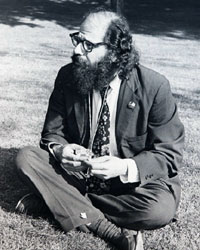
James A. Garfield, from http://banknotegallery.com/Sortby/Sortbypics/garfield.jpg
I’m thrilled to begin teaching expository writing tomorrow, modeled on a professor‘s experiments in teaching expository writing as digital citizenship through blogging. The thing that is least decided at this point is the question of sound: how much shall we practice reading aloud, and how shall I explain why I believe in the live, voiced, spirited language that is both heard and read? (Yes, that’s shall. We’re in serious territory here, baby.)
Soaking myself in these questions, I picked up some old Peter Elbow this morning. In some ways I was encouraged, especially in his descriptions of how writing often trains our ears to pick up on mysterious resonances in writing. But he also says some things about audience that I’ll have to confront in a class about blogging–which is in many ways predicated on the crucial shaping effects of writing with audiences. In Writing with Power (the 1981 edition, bought in a low-ceilinged, yellow-lighted library bookstore in DC), Elbow writes:
Real voice. People often avoid it and drift into fake voices because of the need to face an audience. I have to go to work, I have to make a presentation, I have to teach, I have to go to a party, I have to have dinner with friends. Perhaps I feel lost, uncertain, baffled–or else angry–or else uncaring–or else hysterical. I can’t sound that way with all these people. They won’t understand, they won’t know how to deal with me, and I won’t accomplish what I need to accomplish. Besides, perhaps I don’t even know how to sound the way I feel. (When we were little we had no difficulty sounding the way we felt; thus most little children speak and write with real voice.) Therefore I will use some of the voices I have at my disposal that will serve the audience and the situation–voices I’ve learned by imitation or made up out of desperation or out of my sense of humor. I might as well. By now, those people think those voices are me. If I used my real voice, they might think I was crazy. (306)
There’s a lot there, and I know I’ve broken like every blogging recommendation by going on for so long. But I think his point needs to be dealt with: whether the voices we put on for audiences crowd out our ability to write with a real sense of power, real resonance, real voice.

Allen Ginsberg, from http://www.erowid.org/culture/characters/ginsberg_allen/images/ginsberg_allen3_med.jpg
I’ll be asking my students to write dialogues as freewriting on the first day of class, so I might as well try it here, since my feelings on this are kind of split and uncertain:
- The part of me that looks like a 19th century photo of a staunch, bearded president, like James A. Garfield: Well, Elbow’s point has obvious problems. When, exactly, am I writing with my “real” self? No, really–I want you to point it out to me.
- The part of me that looks like a hippy–perhaps if James A. Garfield stopped grooming, like Allen Ginsberg or something: But don’t you feel sometimes like you have a real self? When you write something that feels true and honest, doesn’t it feel true and honest and good? Couldn’t you point out those moments in your writing?
- Garfield: Well, I suppose. But that’s not the point. The point is that I believe we always put on rhetorically chosen selves when we communicate with different audiences. These rhetorically chosen selves are collectively “ourselves.”
- Ginsburg: Um, that’s really sad. Seriously, do you know how sad that sounds? You’re basically adopting the persona of secular humanism here, pushing aside all possibility of spirit, of true identity. And more to the point, you’re pushing aside the possibility that writing can be more resonant when writers push aside their fears of how audiences will judge them. That’s the real point here, isn’t it?
- Garfield: But you can’t just push aside audience concerns, especially in the age of blogging. [Garfield pulls out an iPad or something in the portrait?] Audiences who don’t jive with how you’ve chosen to write won’t take the time to keep reading; they can go elsewhere, to places that fit their discourse style. Audience is king.
- Ginsburg: If audience is king, then you’d better make sure that you don’t lose something personal and precious in the transaction. In other words, be careful that all that catering to audience doesn’t lead you to ape the content that you think those audiences want to hear. Say the things that you want to say, and to an extent, push the boundaries of what they expect, too. I mean, people like to be surprised, man.
So that’s that. I kind of thought writing this out would lead me to more fully embrace one side or the other, but instead I feel less decided than ever–but more comfortable with my indecision than ever. Nice.


